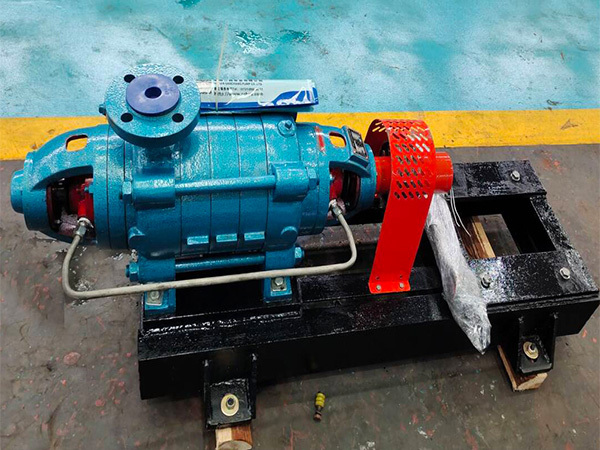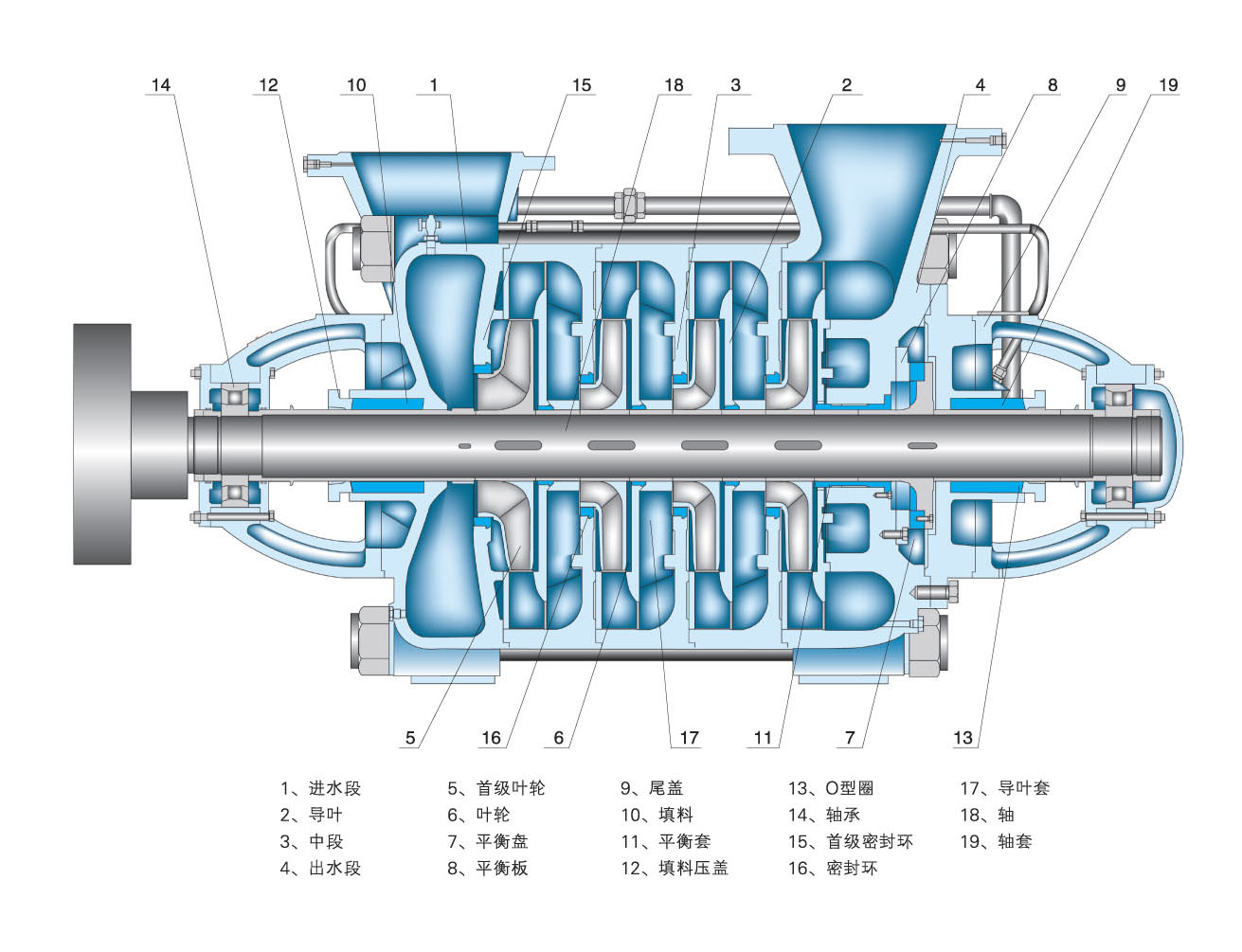


DY type multistage oil pump
Classification:
Multistage centrifugal pump
Petrochemical industry
Electric power industry
Product classification
Oil pump
DY type multistage oil pump
Key words:
water pump
Head range: 50~2000m
Conveying temperature: 0 ℃ ~ 80 ℃
Inlet pressure: allowable inlet pressure 0.6MPa
Sealing form: packing seal, mechanical seal
Water pump material: HT200, HT250, QT600, ZG, 304, 316, 316L, 317L, 904L, CD4-MCu, etc

Hotline:
- Product Description
- Performance Parameter
- Installation Drawings
- Installation And Use
- Faults And Solutions
-
- Commodity name: DY type multistage oil pump
Flow range: 3.75~1400 m3/h<br>Head range: 50~2000m<br>Conveying temperature: 0 ℃ ~ 80 ℃<br>Inlet pressure: allowable inlet pressure 0.6MPa<br>Sealing form: packing seal, mechanical seal<br>Water pump material: HT200, HT250, QT600, ZG, 304, 316, 316L, 317L, 904L, CD4-MCu, etc</br></br></br></br></br>
DY type multi-stage oil pump is horizontal, single-suction multi-stage, segmented structure, with high efficiency, low operating noise, good anti-cavitation performance, reasonable structure, long service life and other significant advantages. Can transport hot water, oil, corrosive and abrasive media. It is used to transport petroleum and petroleum products containing no solid particles with a viscosity of less than 120 centistokes. Product implementation of JB/T1051-93 "multistage centrifugal pump type and basic parameters" standard.
DY-type multi-stage oil pump This series of pumps is a horizontal single-suction multi-stage segmented centrifugal pump, which adopts the hydraulic model of high-efficiency and energy-saving products recommend used by the state, and is in a leading position in technology in the industry. It has the advantages of high efficiency, wide performance range, safe and stable operation, low noise, long life: easy installation and maintenance.

Structure Description
This type of pump is a single shell, single suction, multi-stage type segmental centrifugal pump structure, the pump inlet level, the outlet vertical upward specific structure is as follows:
2.1 stator part
It is mainly composed of parts such as the front section, middle section, guide vane, rear section, bearing frame and balance chamber cover, etc., which are integrated with through bars and nuts. Both sides of the front section and rear section are fixed on the pump seat with bolts and nuts.
2.2 rotor components
It is mainly tightened by the impeller, impeller stop sleeve, balance stop sleeve, balance disc and shaft sleeve parts with small round nuts, and fixed on the shaft with flat keys to prevent rotation. The entire rotor is supported on bearings at both ends. The rotor is directly connected with the motor by an elastic pin coupling.
In order to compensate for the expansion, a toothed pad is installed between the last stage and the balance stop sleeve, which should be replaced during pump maintenance.
2.3 balance mechanism
The pump adopts a balance disc hydraulic balance device that can completely and automatically balance the axial force. The device is composed of four parts: balance plate, balance disc, balance sleeve and balance block sleeve.
Model Description
Example: DY46-50 × 4
DY-multistage centrifugal oil pump
46-Design point flow is 46m 3/h
50-single stage lift at design point 50m
4-the number of stages is 4
Example: 100D16 × 3
100-100mm diameter of pump suction
D-multistage centrifugal fresh water pump
16-pump design point single stage head 16m
3-Level 3
Use
It is used to transport oils and petroleum products that do not contain solid particles, have a temperature of 20 ° C to 105 ° C, and have a viscosity of less than 120 centistokes.
-
Performance range
Flow range: 3.75~1400 m3/h
Lug range: 50~1800m
Conveying temperature: 0 ℃ ~ 80 ℃
Inlet pressure: allowable inlet pressure 0.6MPa
Sealing form: packing seal, mechanical seal
Water pump material: HT200, HT250, QT600, ZG, 304, 316, 316L, 317L, 904L, CD4-MCu, etc
-

-
Preparation before 1. installation
1. Determine the installation location of the multi-stage pump: the location where the installation is stable and easy to operate, repair and overhaul should be selected.
2. Confirm the location of the water injection port: the water injection port should be set at the inlet pressure pipe and about 20cm away from the pump to avoid backflow and change the impeller speed of the multi-stage pump.
3. Deal with the inlet pressure pipeline: prepare the pipeline and flange connection part to ensure that the connection part is free of foreign matter or rust.
4. Prepare the power supply and cables: select the appropriate cable according to the power requirements of the multi-stage pump, and ensure that the cable quality is good.
2. installation steps
1. Assemble the components: Assemble the components according to the requirements of the instructions or drawings, and determine the positions of the drain, vent, and lubrication parts.
2. Install the multi-stage pump: place the multi-stage pump in the installation position, pay attention to the smooth contact between the base of the multi-stage pump and the ground, and the seat surface of the base is perpendicular to the ground.
3. Interface connection: connect the inlet pressure pipe and the outlet pressure pipe. The connecting flange shall be parallel and horizontal without distortion and deformation.
4. cable wiring: according to the multi-stage pump electrical connection diagram wiring, pay attention to the standardization of wiring and reasonable wiring.
5. Water injection and drainage: open the stop valve of the inlet pressure pipe of the multi-stage pump, and introduce clean water (or including the added pump irrigation and drainage liquid) into the pump to avoid abnormal noise caused by pump vibration.
6. Adjust the pump: adjust the frequency converter or on-demand reducer to ensure that the motor of the multi-stage pump works normally and the water flow speed is moderate.
Inspection after 3. installation
1. Check the overall installation of the pump: to ensure that the base of the multi-stage pump is stable and vertical.
2. Check the connection of each pipeline: confirm whether each interface is tightly connected and whether there are abnormal conditions such as abnormal noise.
3. Pump movement test: turn on the power, check whether the motor rotation is stable, whether the sound is normal, whether the pump is leaking, etc.
4. System pressure test: In the experiment, the intelligent instrument records data such as the opening and closing state of the control valve and the water flow. During the test, pay attention to whether there are abnormal conditions such as noise, vibration or high temperature around the system, and deal with any abnormalities in time.
5. Check the wires: Confirm whether the wires are correctly wired and free of damage and other relevant details meet the installation specifications.
The above is a detailed explanation of the installation steps of the multi-stage pump. I hope readers can install the multi-stage pump correctly according to the above steps to ensure that the installed multi-stage pump can operate normally and provide better protection for production and life.
-
Fault one: multi-stage pump does not absorb water pressure gauge and vacuum gauge pointer beating violently
Cause: 1. Insufficient water injection and diversion 2. Air leakage at the connection between pipeline and instrument 3. Excessive suction
Solution: 1. Check whether the bottom valve leaks. 3. Lower the suction height
Fault two: multi-stage pump does not absorb water vacuum table indicates a high degree of vacuum
Reason: 1. The bottom valve is not opened or blocked 2. The resistance of the suction pipeline is too large 3. The filter is blocked
Solution: 1. Check the bottom valve 2. Replace the water absorption 3. Clean the filter
Fault three: pressure gauge pressure but still not out of water
Reason: 1. The resistance of the outlet pipe is too large 2. The rotation direction is wrong 3. The outlet pipe valve is not open 4. The impeller is blocked
Solution: 1. Check or short water pipe 2. Check the motor. Two-phase intermodulation 3. Open the outlet valve 4. Remove the dirt in the impeller
Fault four: can not reach the design flow
Reason: 1. air inhalation 2. due to the lowering of the water level. The submerged depth is not enough. 3. The impeller is blocked by foreign matter. 4. The rotor is severely worn.
Solution: 1. Check the air leakage site and exclude 2. Extend the suction pipe. Deepen the flooding depth 3. Remove and remove foreign objects 4. Replace the sealing ring
Fault five: multi-stage pump power consumption is too large
Reason: 1. Packing is too tight. And heat 2. The flow is too large 3. The rotating body and the shell rub 4. The pump bearing is worn 5. The pump shaft is bent.
Solution: 1. Relax the packing pressure appropriately 2. Close the gate valve opening 3. Trim the position of the rotary body and the shell 4. Replace the bearing 5. Replace or correct
Fault six: multi-stage pump vibration increased
Reason: 1. The impeller is partially blocked 2. The impeller is damaged 3. The flow rate is too small 4. The pump shaft is not concentric with the motor 5. The bearing is damaged 6. Air is mixed. Cavitation occurs
Solution: 1. Disassemble and remove foreign matter 2. Replace the impeller 3. Slightly open the outlet valve 4. Point aligning 5. Change the suction position. Improved water absorption
Next Page
Product Consulting
If you are interested in our products, please leave your email, we will contact you as soon as possible, thank you!


